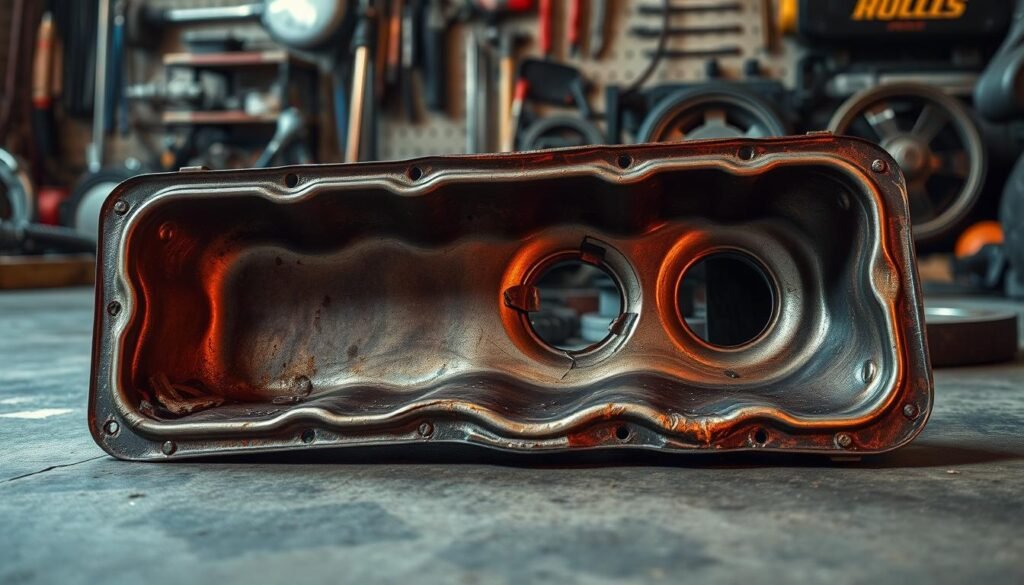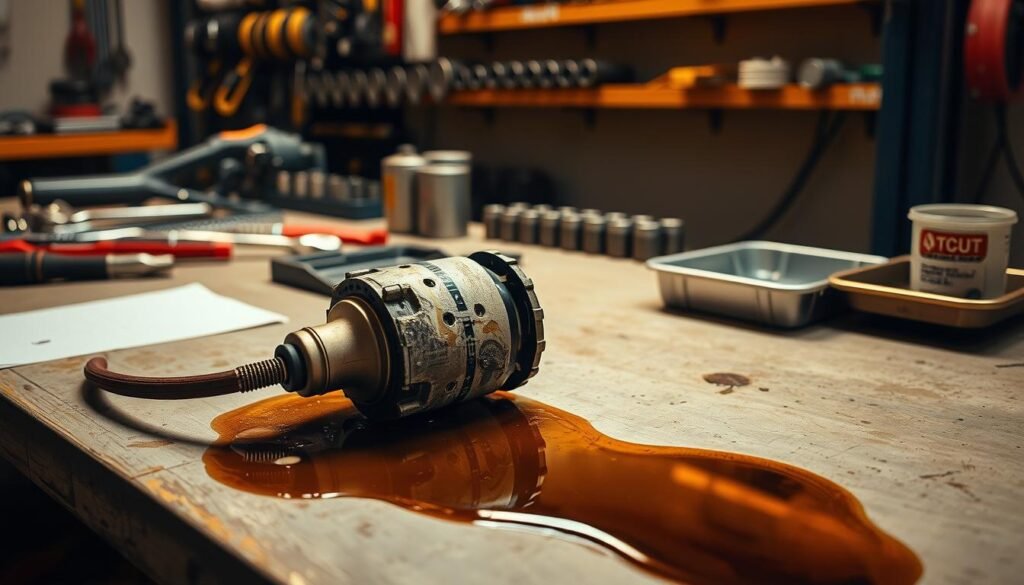Are you noticing mysterious puddles under your car or a persistent burning smell while driving? This could be a sign of an oil leak, a potentially serious issue that affects your vehicle’s health and your wallet.
Engine oil is crucial for lubricating, cleaning, and cooling your engine components. Ignoring an oil leak can lead to severe engine damage and costly repairs down the road.
Understanding the factors that influence oil leak repair costs is essential for making informed decisions about your vehicle’s maintenance. In this guide, we’ll explore the typical costs associated with fixing different types of oil leaks.
Key Takeaways
- Factors influencing oil leak repair costs
- Average price ranges for various oil leak repairs
- Importance of timely intervention for engine health
- How to recognize reasonable or excessive mechanic quotes
- Consequences of leaving oil leaks untreated
Understanding Oil Leaks and Their Importance
Understanding the importance of engine oil and recognizing the signs of an oil leak are crucial for maintaining your vehicle’s health. Engine oil is the lifeblood of your car’s engine, playing a critical role in its operation and longevity.
The Critical Role of Engine Oil
Engine oil serves multiple vital functions in your vehicle. It lubricates the engine’s moving parts, reducing friction and preventing overheating. Proper lubrication is essential for the longevity and performance of your engine. Additionally, engine oil helps to clean the engine by carrying away dirt and debris. It also acts as a sealant between the engine’s piston rings and cylinder walls, improving combustion efficiency.
A well-maintained engine oil system is crucial for the overall health of your vehicle. Regular oil changes and checks are necessary to ensure that your engine oil remains effective and your engine stays in good condition.
Why Oil Leaks Shouldn’t Be Ignored
Oil leaks can lead to significant problems if not addressed promptly. Ignoring an oil leak can result in decreased engine performance, increased risk of engine failure, and potentially costly repairs. When engine oil leaks out, the engine’s components are not adequately lubricated, leading to increased wear and tear. This can cause the engine to overheat, seize, or suffer from reduced efficiency.
“Neglecting oil leaks can have severe consequences on your vehicle’s engine, potentially leading to premature wear and costly repairs.”
Signs Your Car Has an Oil Leak
Recognizing the signs of an oil leak is key to preventing engine damage. Besides an oil stain under your car, you might also notice blue smoke coming from the hood of your vehicle or exhaust and a strong burning smell. If your car is leaking fluid that is black, amber, or a light or dark brown, that is more often than not an oil leak.
Some common indicators of an oil leak include:
- Dark spots or puddles underneath your parked vehicle, typically appearing brown or amber in color.
- A burning oil smell, especially when your engine reaches operating temperature.
- Blue smoke coming from your exhaust, suggesting oil is burning in the combustion chambers.
- Dashboard warning lights, particularly the oil pressure warning light or check engine light.
- Declining oil levels between regular service intervals.
| Signs of Oil Leak | Description |
|---|---|
| Dark Spots or Puddles | Typically brown or amber in color, found under the parked vehicle. |
| Burning Oil Smell | Noticed especially when the engine is warm. |
| Blue Smoke from Exhaust | Indicates oil burning in the combustion chambers. |
| Dashboard Warning Lights | Oil pressure warning light or check engine light may illuminate. |
| Declining Oil Levels | Noticed between regular oil change intervals. |
Common Causes of Oil Leaks
Several factors can contribute to oil leaks in your vehicle, and identifying them is key to preventing further damage. Oil leaks can stem from various sources, and understanding these causes can help you address the issue effectively.
Degraded Engine Gaskets
Engine gaskets play a crucial role in sealing the engine’s components and preventing oil leaks. Over time, these gaskets can degrade due to heat, pressure, and wear, leading to leaks. Degraded engine gaskets are a common cause of oil leaks, and replacing them can often resolve the issue. The gasket between the engine and oil pan, for instance, is prone to degradation and can cause noticeable leaks.
Worn-Out Seals and Plugs
Seals and plugs are used throughout the engine to prevent oil from escaping. As these components age, they can become worn out or damaged, leading to leaks. Regular inspection can help identify worn-out seals and plugs before they cause significant problems. Replacing these parts is usually straightforward and can prevent more serious issues.
- Regular maintenance can help extend the life of seals and plugs.
- Using high-quality replacement parts can improve the longevity of your engine.
Oil Filter Issues
Oil filter problems are another common cause of oil leaks. If the oil filter is not properly tightened or is damaged, it can lead to leaks. Ensuring that the oil filter is correctly installed and using the right type of filter for your vehicle can prevent such issues. Always check the oil filter during routine maintenance to catch any potential problems early.
Damaged Oil Pan
A damaged oil pan can also cause oil leaks. The oil pan is susceptible to damage from road debris and can be dented or cracked, leading to leaks. In regions where road salt is used, corrosion can also weaken the oil pan over time. If you notice an oil slick under your car or a burning smell, it could indicate a damaged oil pan gasket or the pan itself.

The oil pan gasket sits between the bottom of the engine and the oil pan. If this gasket is leaking, you might notice signs such as an oil slick on the ground or smoke coming from the engine. Addressing a damaged oil pan or its gasket promptly is crucial to prevent further engine damage.
How Much Does It Cost to Fix an Oil Leak?
The expense associated with repairing an oil leak is a common query among car owners who are dealing with this issue. The cost can vary significantly based on several factors, including the source of the leak, the type of repair needed, and the labor rates of the repair shop.

Gasket Replacement Costs
Gasket replacement is a common solution for oil leaks. The cost of replacing gaskets can vary depending on the type and location of the gasket.
Valve Cover Gasket
Replacing a valve cover gasket is a relatively straightforward process. The cost typically ranges from $150 to $400, depending on the vehicle’s make and model.
Oil Pan Gasket
Oil pan gasket replacement is more labor-intensive and can be more expensive, with costs ranging from $300 to $1,000 or more.
Timing Cover Gasket
The timing cover gasket replacement cost can vary widely, from $200 to $800, depending on the complexity of the job and the vehicle’s specifications.
Seal Replacement Costs
Seal replacements are another common repair for oil leaks. The cost can vary based on the type of seal and its location within the engine.
Crankshaft Seals
Crankshaft seal replacement can be a costly repair, with prices ranging from $500 to $1,500, due to the complexity and labor involved.
Other Engine Seals
Other engine seals, such as those on the camshaft or valve stem, can have varying replacement costs, typically between $100 and $500.
Oil Filter and Related Repairs
Oil filter issues can sometimes be the cause of an oil leak. Replacing an oil filter is generally inexpensive, costing between $20 and $100.
Diagnostic Fees
If you’re not sure where the leak is coming from, you’ll likely need to pay for a diagnostic service. Diagnostic fees typically range from $80 to $150, although many repair shops will waive this fee if you proceed with the recommended repairs.
- Professional oil leak diagnosis typically costs $80-$150.
- Diagnostic procedures often include visual inspection, UV dye testing, and pressure testing.
- Some complex oil leaks require partial disassembly for proper diagnosis.
- Many vehicles have multiple oil leaks simultaneously, requiring comprehensive testing.
Factors That Impact Oil Leak Repair Costs
Multiple elements contribute to the final bill for oil leak repairs, and being aware of them can help you prepare. When facing an oil leak, it’s crucial to understand that the repair cost isn’t fixed and can vary based on several factors.

Vehicle Make and Model
The make and model of your vehicle play a significant role in determining oil leak repair costs. Luxury or high-performance vehicles often require specialized parts, which can be more expensive. Additionally, some models have more complex engine designs, potentially increasing labor costs.
Repair Shop Labor Rates
Labor rates at repair shops can vary significantly depending on location, shop reputation, and technician expertise. Urban areas typically have higher labor rates compared to rural areas. Dealerships often charge more than independent repair shops, but may offer specialized knowledge for your vehicle’s make.
Parts Quality and Pricing
The quality and pricing of replacement parts can significantly impact the overall cost. Original Equipment Manufacturer (OEM) parts are generally more expensive than aftermarket alternatives, but may offer better quality and warranty coverage. It’s essential to discuss the pros and cons of different part options with your mechanic.
Leak Location and Accessibility
The location and accessibility of the oil leak can greatly affect repair costs. Leaks in hard-to-reach areas may require more labor hours, increasing the overall cost. For instance, a leak near the front of the engine might be easier and cheaper to fix than one located deep within the engine compartment.
Warranty Coverage
Warranty coverage can significantly reduce your out-of-pocket expenses for oil leak repairs. As noted by industry experts, “Understanding your warranty coverage is crucial before proceeding with oil leak repairs.” Here are some key points to consider:
- New vehicle warranties typically cover oil leaks for 3-5 years or 36,000-60,000 miles as part of the powertrain coverage.
- Extended warranties and vehicle service contracts may cover oil leak repairs beyond the factory warranty period, though often with a deductible.
- Some repair facilities offer their own warranties on oil leak repairs, typically ranging from 12-24 months or 12,000-24,000 miles.
Always check your warranty coverage before paying for repairs to avoid unexpected expenses.
Making Smart Decisions About Oil Leak Repairs
When dealing with an oil leak, making informed decisions is crucial to avoid costly repairs down the line. An oil leak might seem like a minor issue, but if left untreated, it can cause more significant problems, from spark plug replacements to major engine rebuilds.
You have the option to fix your leaking car, but if the repairs cost more than your car is worth, it might be more economical to consider alternative options. To save money on oil leak repair, adopting a preventative approach is essential. Regular maintenance, including timely oil changes with the correct viscosity oil, can prevent many common causes of oil leaks, particularly those related to oil degradation and sludge buildup.
Here are some key considerations for managing oil leak repairs effectively:
- Addressing oil leaks promptly almost always costs less than dealing with the consequences of continued leaking, which can include engine damage, environmental cleanup, and towing expenses.
- For older vehicles with multiple issues, prioritize repairs based on severity, fixing the most significant leaks first while monitoring minor seepage.
- Consider your car’s overall value and condition when deciding how much to invest in repairs—extensive repairs may not be economically justified for vehicles nearing the end of their useful life.
- DIY leak repair can save substantial labor costs for those with mechanical skills, though special tools and proper workspace considerations are important factors.
- Getting multiple repair quotes from different shops can reveal significant price variations for the same work, potentially saving hundreds of dollars.
- Consider the environmental impact of oil leaks, as even small amounts of engine oil can contaminate soil and water systems when allowed to drip onto driveways or roads.
- For vehicles with extensive oil leak issues where repair costs approach or exceed the vehicle’s value, selling or trading the vehicle might be more economical than comprehensive repairs.
By understanding the causes of oil leaks and taking proactive steps to address them, you can prevent more costly damage to your car’s engine. Regular maintenance and timely repairs are key to managing oil leak issues effectively and ensuring your vehicle remains in good condition.
To fix oil leak issues efficiently, it’s crucial to be informed and proactive. By doing so, you can avoid unnecessary expenses and extend the life of your car’s engine.
FAQ
Frequently Asked Questions (FAQs) About Oil Leak Repair Costs
1. So, really, how much does it cost to fix an oil leak on average?
Pinpointing an exact average is tricky because the source of the leak dramatically impacts the price. However, generally speaking, the Oil leak repair cost can range from as low as $100 – 800 – $2,500+ for more complex jobs like replacing a rear main seal or a head gasket, which require significant labor. Knowing how much does it cost to fix an oil leak truly depends on the diagnosis.
2. What are the biggest factors that influence the final Oil leak repair cost?
Several key factors determine how much does it cost to fix an oil leak:
-
Part Needed: The specific seal, gasket, or component that failed. Some parts are inexpensive, while others (like a cracked oil pan) cost more.
-
Location & Accessibility: A leak source that’s easy to reach (like a valve cover) will have lower labor costs than one requiring major engine or transmission disassembly (like a rear main seal). This is often the biggest driver of the Oil leak repair cost.
-
Vehicle Make & Model: Parts pricing and labor times can vary significantly between different car brands and models (e.g., luxury/European vs. domestic/common models).
-
Labor Rates: Your mechanic’s hourly rate affects the overall bill.
3. Is it really worth paying the Oil leak repair cost for just a small leak?
Yes, almost always! Ignoring even a small leak is asking for trouble. Low oil levels can lead to friction, overheating, and catastrophic engine damage – repairs far exceeding the initial Oil leak repair cost. Furthermore, leaking oil damages rubber hoses/belts, pollutes the environment, creates unsightly stains, and can even be a fire hazard if it drips onto hot exhaust components. Addressing the question of how much does it cost to fix an oil leak early usually saves significant money and hassle down the road.
4. Can I get an accurate estimate of how much does it cost to fix an oil leak without taking it to a mechanic?
While you can research potential costs for common leaks on your specific vehicle model online, getting an accurate estimate requires a professional diagnosis. A mechanic needs to pinpoint the exact source of the leak, which might involve cleaning the engine and using dye or pressure tests. Only after proper diagnosis can they provide a reliable quote for the specific Oil leak repair cost for your situation. Don’t rely solely on generic online figures.